- Home
- Publications & Research
Publications & Research Archive
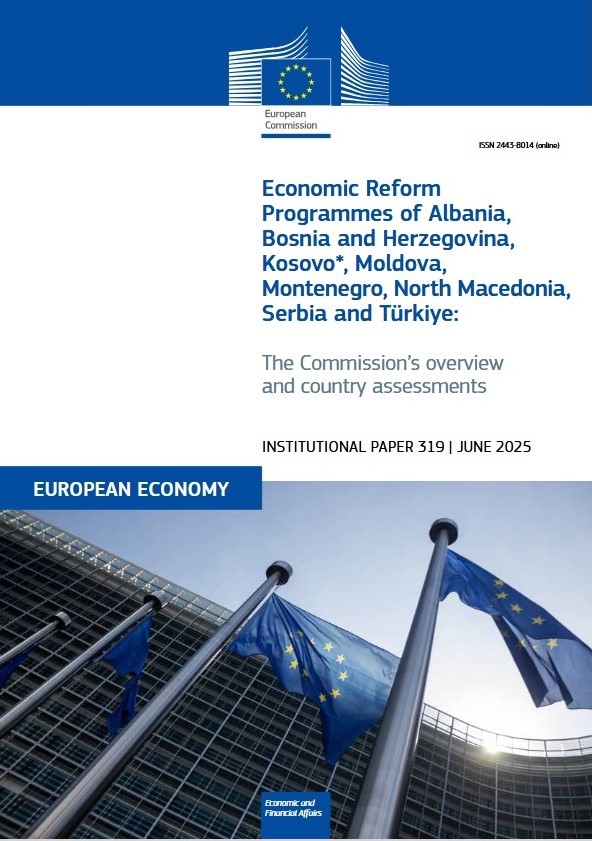
2025 Economic Reform Programmes of Albania, Bosnia and Herzegovina, Kosovo*, Moldova, Montenegro, North Macedonia, Serbia and Türkiye: The Commission’s Overview and Count
03 JUNE 2025 | REPORT
This report contains the Commission's assessments of the 2025 Economic Reform Programmes (ERPs) of candidates or potential candidates for EU membership.
Source: European Commission
https://economy-finance.ec.europa.eu/
Download: EN
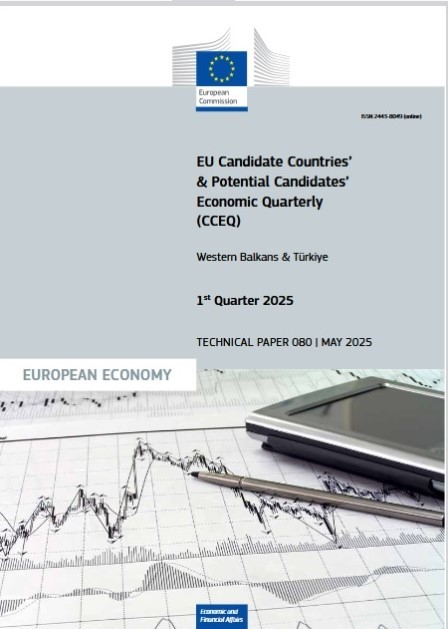
EU Candidate Countries’ & Potential Candidates’ Economic Quarterly (CCEQ) – Western Balkans and Türkiye. 1st Quarter 2025
15 MAY 2025 | REPORT
The unemployment rate fell in most economies of the region in 2024. Economic expansion has led to further job creation in the Western Balkans, although annual employment growth slowed to 1.5%1 on average, while labour force participation increased in some economies. Overall, unemployment rates in the region were at historically low levels but remained higher than in the EU, ranging from 8.6% in Serbia to 12.5% in North Macedonia.
This document is written by the staff of the Directorate-General for Economic and Financial Affairs, Directorate D for International Economic and Financial Relations and Global Governance, Unit D1 – Candidate and Pre-Candidate Countries.
Download: EN

2024 EU Enlargement Package: Serbia Report
31 OCTOBER 2024 | REPORT
On 30 October 2024, the European Commission adopted its annual Enlargement Package, providing a detailed assessment of the state of play and the progress made by Albania, Bosnia and Herzegovina, Kosovo, Montenegro, North Macedonia and Serbia on their respective paths towards EU accession. The assessments are accompanied by recommendations and guidance on the reform priorities.
The Commission reiterates its assessment that Serbia has fulfilled the benchmarks to open cluster 3 (Competitiveness and inclusive growth). In the coming year, Serbia is expected to speed up the work on the implementation of EU-accession related reforms across the board, with a particular focus on the rule of law interim benchmarks as well as ensuring a truly enabling environment for civil society and media, making credible efforts to shut down disinformation and foreign information manipulation.
Serbia Report can be downloaded below.
Source: EU
Download: EN

2024 EU Enlargement Package: North Macedonia Report
31 OCTOBER 2024 | REPORT
On 30 October 2024, the European Commission adopted its annual Enlargement Package, providing a detailed assessment of the state of play and the progress made by Albania, Bosnia and Herzegovina, Kosovo, Montenegro, North Macedonia and Serbia on their respective paths towards EU accession. The assessments are accompanied by recommendations and guidance on the reform priorities.
In the case of North Macedonia, the country needs to continue to deliver on the implementation of EU-related reforms, in particular under the fundamentals cluster, notably the judiciary, the fight against corruption and organised crime. Trust in the justice system needs to be strengthened. The screening sessions for all the six clusters of the EU acquis were completed in December 2023.
North Macedonia Report can be downloaded below.
Source: EU
Download: EN

2024 EU Enlargement Package: Montenegro Report
31 OCTOBER 2024 | REPORT
On 30 October 2024, the European Commission adopted its annual Enlargement Package, providing a detailed assessment of the state of play and the progress made by Albania, Bosnia and Herzegovina, Kosovo, Montenegro, North Macedonia and Serbia on their respective paths towards EU accession. The assessments are accompanied by recommendations and guidance on the reform priorities.
In June 2024 the intergovernmental conference confirmed that Montenegro overall met the interim benchmarks for the rule of law chapters 23 and 24, providing the opportunity to proceed with provisionally closing further chapters if conditions are met. In the rule of law area and judiciary further progress is needed.
Montenegro Report can be downloaded below.
Source: EU
Download: EN

2024 EU Enlargement Package: Kosovo* Report
31 OCTOBER 2024 | REPORT
On 30 October 2024, the European Commission adopted its annual Enlargement Package, providing a detailed assessment of the state of play and the progress made by Albania, Bosnia and Herzegovina, Kosovo, Montenegro, North Macedonia and Serbia on their respective paths towards EU accession. The assessments are accompanied by recommendations and guidance on the reform priorities.
Kosovo* submitted an application for EU membership in December 2022. The Commission remains available to prepare an Opinion on Kosovo's membership application as soon as the Council requests it. Progress was recorded in the fight against organised crime, and the business environment improved. Visa liberalisation for Kosovo entered into force on 1 January 2024. Kosovo needs to intensify its efforts to strengthen the rule of law and public administration and to protect freedom of expression.
Kosovo* Report can be downloaded below.
Source: EU
Download: EN

2024 EU Enlargement Package: Bosnia and Herzegovina Report
31 OCTOBER 2024 | REPORT
On 30 October 2024, the European Commission adopted its annual Enlargement Package, providing a detailed assessment of the state of play and the progress made by Albania, Bosnia and Herzegovina, Kosovo, Montenegro, North Macedonia and Serbia on their respective paths towards EU accession. The assessments are accompanied by recommendations and guidance on the reform priorities.
Bosnia and Herzegovina demonstrated tangible results including on migration management, full alignment with the EU's common and foreign security policy, as well as by passing legislation on integrity of the judiciary, anti-money laundering and conflict of interest. In March 2024 the European Council decided to open accession negotiations with Bosnia and Herzegovina. The Commission is preparing the negotiating framework with a view to its adoption by the Council the moment all relevant steps set out in the Commission's recommendation of October 2022 are taken.
Bosnia and Herzegovina Report can be downloaded below.
Source: EU
Download: EN

2024 EU Enlargement Package: Albania Report
31 OCTOBER 2024 | REPORT
On 30 October 2024, the European Commission adopted its annual Enlargement Package, providing a detailed assessment of the state of play and the progress made by Albania, Bosnia and Herzegovina, Kosovo*, Montenegro, North Macedonia and Serbia on their respective paths towards EU accession. The assessments are accompanied by recommendations and guidance on the reform priorities.
When it comes to Albania, the Commission welcomes the opening of negotiations on the fundamentals cluster at the second intergovernmental conference held on 15 October 2024. It is crucial for the authorities to further intensify the pace of EU oriented reforms, notably on the rule of law, consolidating the track record on law enforcement, on effectively fighting corruption and organised crime, and the promotion of fundamental rights, including media freedom, property rights, and minorities.
Albania Report can be downloaded below.
Source: EU
Download: EN
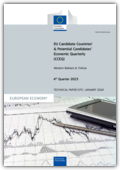
EU Candidate Countries’ & Potential Candidates’ Economic Quarterly (CCEQ) – Western Balkans and Türkiye. 3rd Quarter 2024
25 OCTOBER 2024 | REPORT
An overview of economic developments in candidate and pre-candidate economies.
Download: EN
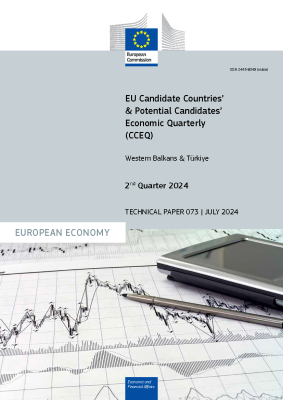
EU Candidate Countries’ & Potential Candidates’ Economic Quarterly (CCEQ) - Western Balkans and Türkiye. 2nd Quarter 2024
16 JULY 2024 | REPORT
An overview of economic developments in candidate and pre-candidate economies.
Download: EN
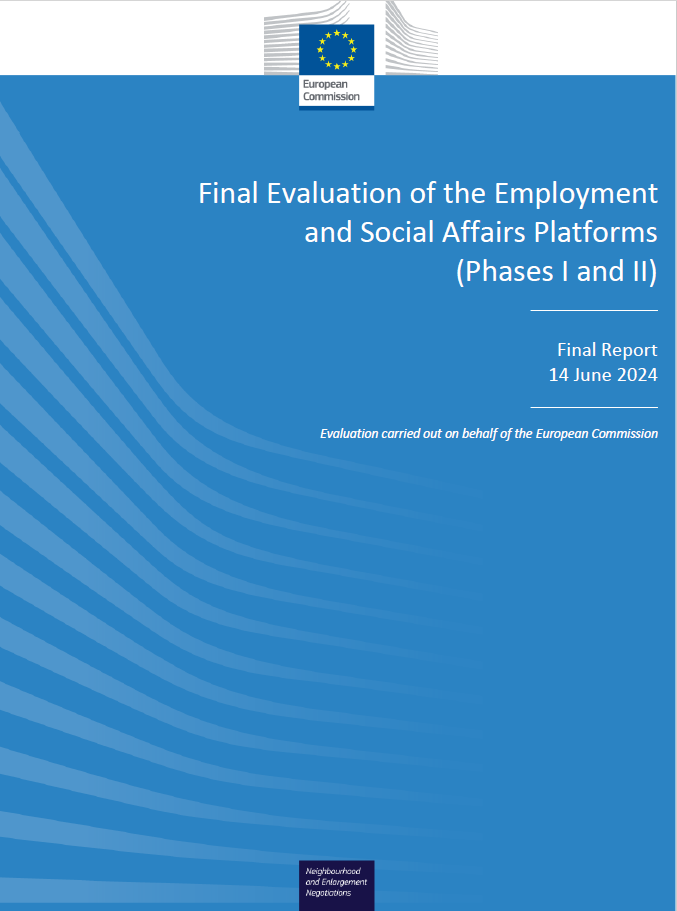
ESAP: Final Evaluation of the Employment and Social Affairs Platforms (Phases I and II)
14 JUNE 2024 | REPORT
Final Evaluation of the Employment and Social Affairs Platforms (Phases I and II), commissioned by European Commission, Directorate-General for Neighbourhood and Enlargement Negotiations.
Download: EN
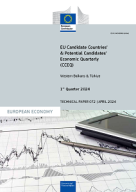
EU Candidate Countries’ & Potential Candidates’ Economic Quarterly (CCEQ) – Western Balkans and Türkiye. 1st Quarter 2024
30 APRIL 2024 | REPORT
An overview of economic developments in candidate and pre-candidate economies.
Source: EU
Download: EN

EU Candidate Countries’ & Potential Candidates’ Economic Quarterly (CCEQ) – Western Balkans and Türkiye. 4th Quarter 2023
29 JANUARY 2024 | REPORT
EU Candidate Countries’ & Potential Candidates’ Economic Quarterly (CCEQ) report for Western Balkans and Türkiye for the 4th Quarter 2023 is prepared by the staff of the European
Commission’s Directorate-General for Economic and Financial Affairs. Thi sedition was published in January 2024.
The report finds that the growth performance of the Western Balkan region improved in the third quarter of 2023 and economic growth was generally driven by domestic demand. IN addition, The unemployment rate fell in most economies in both a quarterly and annual comparison. Average employment growth accelerated to 1.4%1 y-o-y in the Western Balkans in the third quarter of 2023, while labour force participation increased in some countries, most notably in Albania where it climbed to a record-high 76.1%. Overall, unemployment rates in the region were at historically low levels but remained high compared with the EU, ranging from 9% in Serbia to 13.6% in Bosnia and Herzegovina.
Download:

RCC ESAP 2: Aligning Western Balkan Labour Market Policy Databases with the EU Guidelines
30 NOVEMBER 2023 | REPORT
The report Aligning Western Balkan Labour Market Policy Databases with the EU Guidelines offers a brief regional overview of current practices in the Western Balkans, as well as a comprehensive assessment of each economy’s practices, accompanied by data and recommendations that will help to advocate for labour market and social policy reforms to improve the employment opportunities and working conditions of citizens in the region, as well as enhancing the capacity of institutional stakeholders to align their practices in this area with the EU.
Download: EN

European Commission: European Economic Forecast: Autumn 2023
15 NOVEMBER 2023 | REPORT
The European Comission - Directorate-General for Economic and Financial Affairs has published its European Economic Forecast: Autumn 2023. The report reveals that the European economy has lost momentum this year against the background of a high cost of living, weak external demand and monetary tightening. While economic activity is expected to gradually recover going forward, the European Commission’s Autumn Forecast revises EU GDP growth down compared to its summer projections. Inflation is estimated to have dropped to a two-year low in the euro area in October and is set to continue declining over the forecast horizon.
The report is produced by the European Commission’s Directorate-General for Economic and Financial Affairs.
Download: EN

New Growth Plan for the Western Balkans
08 NOVEMBER 2023 | REPORT
The European Commission presents a new Growth Plan for the Western Balkans including €6 billion in grants and loans to accelerate economic convergence with the EU.
More information can be found here.
Download: EN

Enlargement Package 2023
08 NOVEMBER 2023 | REPORT
On 8 November 2023, the European Commission adopted its 2023 Enlargement Package, providing a detailed assessment of the state of play and the progress made by the Western Balkans, Türkiye, Georgia, Moldova and Ukraine on their respective paths towards the European Union, with a particular focus on implementing fundamental reforms, as well as clear guidance on the reform priorities ahead.
More information can be found here.
Download: EN

Albania Report 2023 - Enlargement Package
08 NOVEMBER 2023 | REPORT
On 8 November 2023, the European Commission adopted its 2023 Enlargement Package, providing a detailed assessment of the state of play and the progress made by the Western Balkans on its path towards the European Union, with a particular focus on implementing fundamental reforms, as well as clear guidance on the reform priorities ahead. The Albania report 2023 can be downloaded below.
Download: EN

Bosnia and Herzegovina Report 2023 - Enlargement Package
08 NOVEMBER 2023 | REPORT
On 8 November 2023, the European Commission adopted its 2023 Enlargement Package, providing a detailed assessment of the state of play and the progress made by the Western Balkans on its path towards the European Union, with a particular focus on implementing fundamental reforms, as well as clear guidance on the reform priorities ahead. The Bosnia and Herzegovina Report 2023 can be downloaded below.
Download: EN

Kosovo* Report 2023 - Enlargement Package
08 NOVEMBER 2023 | REPORT
On 8 November 2023, the European Commission adopted its 2023 Enlargement Package, providing a detailed assessment of the state of play and the progress made by the Western Balkans on its path towards the European Union, with a particular focus on implementing fundamental reforms, as well as clear guidance on the reform priorities ahead. The Kosovo* report 2023 can be downloaded below.
Download:

Montenegro Report 2023 - Enlargement Package
08 NOVEMBER 2023 | REPORT
On 8 November 2023, the European Commission adopted its 2023 Enlargement Package, providing a detailed assessment of the state of play and the progress made by the Western Balkans on its path towards the European Union, with a particular focus on implementing fundamental reforms, as well as clear guidance on the reform priorities ahead. The Montenegro Report 2023 can be downloaded below.
Download: EN

North Macedonia Report 2023 - Enlargement Package
08 NOVEMBER 2023 | REPORT
On 8 November 2023, the European Commission adopted its 2023 Enlargement Package, providing a detailed assessment of the state of play and the progress made by the Western Balkans on its path towards the European Union, with a particular focus on implementing fundamental reforms, as well as clear guidance on the reform priorities ahead. The North Macedonia Report 2023 can be downloaded below.
Download: EN

Serbia Report 2023 - Enlargement Package
08 NOVEMBER 2023 | REPORT
On 8 November 2023, the European Commission adopted its 2023 Enlargement Package, providing a detailed assessment of the state of play and the progress made by the Western Balkans on its path towards the European Union, with a particular focus on implementing fundamental reforms, as well as clear guidance on the reform priorities ahead. The Serbia Report 2023 can be downloaded below.
Download: EN

EU Candidate Countries’ & Potential Candidates’ Economic Quarterly (CCEQ) – Western Balkans and Türkiye. 3rd Quarter 2023
18 OCTOBER 2023 | REPORT
The unemployment rate fell compared to the previous quarter in several economies, and in most of them it was the same or lower than in the same period a year before. Average employment growth slowed to 0.9%1 y-o-y in the Western Balkans in the second quarter of 2023, while labour force participation increased in some economies, most notably in Albania where it climbed to a record-high 75.8%. Overall, unemployment rates in the region remained high compared with the EU, ranging from 9.6% in Serbia to 13.5% in Montenegro.
European Economy Technical Papers are reports and data compiled by the staff of the European Commission’s Directorate-General for Economic and Financial Affairs.
Download: EN

EU Candidate Countries’ & Potential Candidates’ Economic Quarterly (CCEQ) – Western Balkans and Türkiye. 2nd Quarter 2023
14 JULY 2023 | REPORT
After six consecutive quarters of slowing growth, economic output in the Western Balkan region expanded faster in the first quarter of 2023 than in the previous three months. The region’s GDP growth accelerated marginally to 1.7% year-on-year from 1.6% in the preceding quarter as most economies, except for Albania and Bosnia and Herzegovina, recorded a pick-up in the rate of output growth.
European Economy Technical Papers are reports and data compiled by the staff of the European Commission’s Directorate-General for Economic and Financial Affairs.
Download: EN

EUROPEAN COMMISSION: Employment and Social Developments in Europe 2023
07 JULY 2023 | REPORT
The European Commission - Directorate-General for Employment, Social Affairs and Inclusion has published its Employment and Social Developments in Europe (ESDE) report 2023.
The report reveals that despite the impact of Russia's invasion of Ukraine resulting in an economic slowdown in the second half of 2022, EU labour markets have demonstrated remarkable resilience in 2022. The EU economy grew by 3.5% in real terms in 2022. Employment rates were at a record high at 74.6% with 213.7 million people employed in 2022, and unemployment rates at a historic low at 6.2%.
However, challenges remain with a low labour market representation of certain groups, such as women or persons with a disability. Youth unemployment fell from 16.7% in 2021 to 14.5% in 2022, but remains a major challenge. In addition, companies face labour shortages and there is the need for both employers and workers to adapt to evolving skill needs, in the context of the green and digital transitions.
The share of people at risk of poverty or social exclusion remained stable at 21.6% in 2022 with social transfers reducing poverty by more than one third on average in the EU. However, real household income declined, as high inflation continued to erode purchasing power. This resulted in a rise in severe material and social deprivation (from 6.3% to 6.7%).
More information is available HERE.
Download: EN

EU Candidate Countries’ & Potential Candidates’ Economic Quarterly (CCEQ) – Western Balkans and Türkiye. 1st Quarter 2023
28 APRIL 2023 | REPORT
The economic rebound in the Western Balkans moderated in 2022, impacted by the fallout from Russia’s war of aggression against Ukraine, with the region’s GDP growing by 3.2% compared to 7.7% in 2021. The slowdown in annual output growth was most pronounced in the second half of the year and was driven by Serbia, the largest economy in the region. In the fourth quarter of 2022, the region’s GDP rose by only 1.6% year-on-year.
European Economy Technical Papers are reports and data compiled by the staff of the European Commission’s Directorate-General for Economic and Financial Affairs.
Download: EN

RCC ESAP 2: Regional Overview of Western Balkan Economies Regarding the European Pillar of Social Rights 2022
28 APRIL 2023 | STUDY
This report analyses the progress of six Western Balkan economies (Albania, Bosnia and Herzegovina, Kosovo*, Montenegro, North Macedonia, Serbia) regarding the 20 principles of the European Pillar of Social Rights (EPSR). The ‘2022 review of the performance of Western Balkan (WB) economies regarding the European Pillar of Social Rights’ has been conducted by the Employment and Social Affairs Platform 2 (ESAP 2) programme implemented by the Regional Cooperation Council (RCC) and funded by the European Union. It was produced by WINS Global Consult (Germany), on behalf of the RCC.
Download: EN

ETF Report: Key indicators on education, skills and employment 2022
09 FEBRUARY 2023 | REPORT
This report provides, produced by European Training Foundation (ETF), the main findings and results from the 2022 collection of statistics on education, skills and employment in the ETF’s partner economies. In addition, it provides the results of some ETF new strands of work: youth transition and skills mismatch. A statistical snapshot enabling the EU’s candidate economies to reference themselves against the EU is also included, while the overview of data completes the report.
Download: EN

European Commission: EU Candidate Countries’ & Potential Candidates’ Economic Quarterly (CCEQ) – Western Balkans and Türkiye. 4th Quarter 2022
31 JANUARY 2023 | REPORT
The economic rebound in the Western Balkans moderated further in the third quarter of 2022, with the region’s GDP growing by 2.1% y-o-y, compared to 4.3% in the previous three months. The deceleration was largely driven by a slowdown in Serbia and Bosnia & Herzegovina.
Job growth turned marginally negative on a year-on-year basis in the Western Balkans in the third quarter of 2022. Despite this, unemployment rates fell or remained unchanged while labour force participation decreased in some countries. Still, unemployment rates in the region remained high,
ranging from 8.9% in Serbia to around 21% in Kosovo (the latter reflects the latest available data for 2021 as a whole).
Download: EN

RCC: Women Entrepreneurship in the Western Balkans - economy factsheets
10 JANUARY 2023 | FACTSHEET
Gender statistics play an important role for evidence-based policy making in support of women entrepreneurship. Hence, a thorough review of gender statistics in the Western Balkans, with a specific focus on “women entrepreneurship”, has been commissioned by Regional Cooperation Council. In addition, a sector review for “women in agriculture” has enriched the insights and has been included considering the strategic importance of the agro-food sector in the Common Regional Market Action Plan’s value chains.
The findings will further contribute to the discussion and work of the Regional Network of Women in Entrepreneurship.
Here is what women entrepreneurship in Albania, Bosnia and Herzegovina, Kosovo*, Montenegro, North Macedonia and Serbia looks like.

ETF Publication: Embracing the digital age The future of work in the Western Balkans: New forms of employment and platform work
15 DECEMBER 2022 | REPORT
Driven by social, economic and technological changes, labour markets are becoming more flexible in the European Union and its neighbourhing countries. This translates into growth in novel employment relationships, which differ from ‘traditional work’ in terms of working conditions, content, and regulatory and legal ramifications.
Conducted between November 2021 and May 2022, the ETF’s research focused on new forms of employment, including platform work, and the implications on youth employment policies and skills development. The analysis covered six Western Balkan economies, namely Albania, Bosnia and Herzegovina, Kosovo*, Montenegro, North Macedonia and Serbia.
Download: EN

Eurofund-ETF Report: Living, working and COVID-19 in the European Union and 10 EU neighbouring countries
15 DECEMBER 2022 | REPORT
The Living, working and COVID-19 survey, first launched by Eurofound in early 2020, aims to capture the wide-ranging impact of the pandemic on the work and lives of EU citizens. The fifth round of the Eurofound survey, which was implemented in spring 2022, also sheds light on a new uncertain reality caused by the war in Ukraine, record-high inflation and sharp rises in the cost of living. As a pilot survey, a shorter version of the questionnaire was fielded by the European Training Foundation (ETF) in 10 European Union (EU) neighbouring countries (Albania, Georgia, Jordan, Kosovo, Lebanon, Moldova, Morocco, North Macedonia, Palestine and Tunisia). This joint Eurofound-ETF paper presents a selection of results from the survey covering both the EU-27 and the 10 selected EU neighbouring countries.
Download: EN

European Commission: EU Candidate Countries’ & Potential Candidates’ Economic Quarterly (CCEQ) – Western Balkans and Türkiye. 3rd Quarter 2022
21 OCTOBER 2022 | REPORT
An overview of economic developments in candidate and pre-candidate countries.
European Economy Technical Papers are reports and data compiled by the staff of the European Commission’s Directorate-General for Economic and Financial Affairs.
Download: EN

European Commission: EU Candidate Countries’ & Potential Candidates’ Economic Quarterly (CCEQ) – Western Balkans and Turkey. 2nd Quarter 2022
29 JULY 2022 | REPORT
An overview of economic developments in candidate and pre-candidate countries.
European Economy Technical Papers are reports and data compiled by the staff of the European Commission’s Directorate-General for Economic and Financial Affairs.
Download: EN

Employment and Social Developments in Europe - Young Europeans: employment and social challenges ahead
12 JULY 2022 | REPORT
The Commission has published the 2022 edition of the Employment and Social Developments in Europe (ESDE) review.
The new report helps identify and underpin the employment and social policies needed to address the challenges young people are facing to become economically independent, in the face of a worsening socio-economic situation due to Russia's invasion of Ukraine.
Download: EN

World Bank: WESTERN BALKANS REGULAR ECONOMIC REPORT, Spring 2022 - Steering Through Crises
12 MAY 2022 | REPORT
A semi-annual report on recent economic developments and the outlook in the Western Balkans (Albania, Bosnia and Herzegovina, Kosovo*, Montenegro, North Macedonia, and Serbia). The edition looks at the economic and social effects of multiple shocks to the region, including the impact of the war in Ukraine and the energy crisis in Europe.
This work is a product of the staff of The World Bank with external contributions. The findings, interpretations, and conclusions expressed in this work do not necessarily reflect the views of The World Bank, its Board of Executive Directors, or the governments they represent.
Download: EN

European Commission: EU Candidate Countries’ & Potential Candidates’ Economic Quarterly (CCEQ) - 1st Quarter 2022
05 MAY 2022 | REPORT
European Economy Technical Papers are reports and data compiled by the staff of the European Commission’s Directorate-General for Economic and Financial Affairs.
Authorised for publication by Uwe Stamm, Head of Unit D1, Candidate and Pre-Candidate Countries.
The Report is released every quarter of the year.
Download: EN

Exploration of impact investment for skills creation - Existing actions, emerging trends, implementation modalities, best practice
10 MARCH 2022 | REPORT
Exploration of impact investment for skills creation - Existing actions, emerging trends, implementation modalities, best practice is a new, joint report of the Competence Centre on Technology Transfer at the Joint Research Centre, and the European Training Foundation.
This study was set up to provide an overview of impact investment and skills creation in the area of innovation, covering the main features of impact investment, the historical development of the phenomenon, and how it can be linked to the skills creation process.
Download: EN

THE IMPACT OF THE COVID-19 PANDEMIC IN BOSNIA AND HERZEGOVINA
03 MARCH 2022 | REPORT
Prior to the pandemic in 2020, the labour market in Bosnia and Herzegovina had shown signs of improvement with the unemployment rate, based on Labour Force Survey (LFS) data, reaching a historic low. As in the rest of the globe, COVID-19 outbreaks and the containment measures introduced by authorities in Bosnia and Herzegovina have had an adverse impact on the labour market with a corresponding reduction in the number of employed.
Running business operations under the conditions imposed by the COVID-19 pandemic involved a high level of uncertainty, which was not solely dependent on the situation locally but also on the regional and global situation.

World Bank: Western Balkans Regional Economic Report, No. 20, Fall 2021: Greening the Recovery
03 FEBRUARY 2022 | REPORT
Fiscal balances have started to improve as a result of a stronger economic performance, but it will take further effort to replenish buffers. The growth recovery is contributing to buoyant revenue collection across the region, particularly in value-added tax collections, as domestic consumption strengthens. Similarly, a leveling off of public spending in 2021 after the countercyclical surge of 2020 is helping on the expenditure side. As a result, all countries except Bosnia and Herzegovina expect to see a narrower fiscal deficit in 2021, with the average deficit reduced by 2.7 percent of GDP year-on-year. However, the deficits across all economies of the Western Balkans are still above pre-pandemic trends, and the legacy of the pandemic is a stock of public debt that has now reached historic highs in all countries except Serbia and Bosnia and Herzegovina. As the recovery from COVID-19 takes hold, greater efforts will be needed to mobilize and diversify sources of revenue and to streamline expenditure programs, which in turn would help address fiscal vulnerabilities that have arisen during the crisis. In line with global conditions, inflationary pressures in the Western Balkans are on an upward trajectory. Average inflation is projected to reach 2.3 percent in 2021 from 0.9 percent in 2020. On the external side, strengthening demand in advanced economies is driving commodity prices upward and putting pressure on COVID-19-strained logistics networks and global value chains. Similarly, the faster-than-expected recovery in domestic consumption across the region has placed upward pressure on domestic costs, particularly in labor markets during the summer tourism season.
“World Bank. 2021. Western Balkans Regional Economic Report, No. 20, Fall 2021 : Greening the Recovery. World Bank, Washington, DC. © World Bank. https://openknowledge.worldbank.org/handle/10986/36402 License: CC BY 3.0 IGO.”
Download: EN

European Commission: EU Candidate Countries’ & Potential Candidates’ Economic Quarterly (CCEQ) - 4th Quarter 2021
01 FEBRUARY 2022 | REPORT
An overview of economic developments in candidate and pre-candidate countries.
European Economy Technical Papers are reports and data compiled by the staff of the European Commission’s Directorate-General for Economic and Financial Affairs.
Download: EN

Analytical Report on the situation in the labour market of Serbia in the context of the economic crisis caused by the COVID-19 pandemic
10 DECEMBER 2021 | REPORT
In order to better understand the mechanism behind changes on the labour market and changes of
persons’ status on the labour market from one quarter to another, the Report features a detailed analysis
of available quarterly Labour Force Survey (LFS) micro data from 2020.

Impact Assessment of the Active Labour Market Measures in North Macedonia
09 DECEMBER 2021 | REPORT
The aim of this report is to present the results from the impact evaluation of the selected active labour market policies and measures implemented in North Macedonia during the period 2018-2019. In addition, it contains a cost effectiveness analysis in order to assess in monetary terms the short-term outcomes from the ALMMs. The impact evaluation is a part of a general agenda of evidence-based policy making that focuses on redesigning the existing policies in order to achieve the best possible outcomes.

EU Candidate Countries’ & Potential Candidates’ - Economic Quarterly (CCEQ), 3rd Quarter 2021
09 NOVEMBER 2021 | REPORT
The recovery of most Western Balkan economies gained strength in the second quarter of 2021, when the region’s GDP growth accelerated to 14.2% y-o-y, up from 1.8% in the preceding quarter. The annual expansion in economic activity benefited from a low base one year earlier, compared to which household consumption, investment and exports all registered strong growth.
Download: EN

Mapping innovative practices in the field of active labour market policies during the Covid-19 crisis
28 OCTOBER 2021 | REPORT
The present report is part of a wider study commissioned by the European Training Foundation (ETF) and led by Fondazione Giacomo Brodolini on the topic of active labour market policies (ALMPs), labour market transition and skills development in ETF partner countries during the Covid-19 crisis.
Since the Covid-19 outbreak, the ETF has launched several new work strands to capture immediate developments and provide targeted advice or the sharing of innovative solutions in response to the impact of the pandemic. One strand covers socio-economic dynamics and the impact of Covid-19 on the labour market and policy responses in terms of the crisis, post-crisis and recovery phases, with a
focus on the role of ALMPs including skills development programmes.
Download: EN

Assessment of the Effectiveness of Active Labour Market Policies in Crisis and Post-crisis Situation
28 OCTOBER 2021 | FACTSHEET
This is a summary of a report 'Mapping innovative practices in the field of active labour market policies during the Covid-19 crisis' by the European Training Foundation (ETF) that offers lessons on how Active Labour Market Policies (ALMPs) can be used to combat unemployment and improve human capital development during the pandemic-induced crisis and in light of trends such as climate change and digitalisation.
A crisis can help set the stage for innovation and redefinitions of policy objectives. The present period presents opportunities to experiment with a broad range of ALMPs and to accelerate their adoption or consolidate their implementation.
Download: EN

ETF Publication: CHANGING SKILLS FOR A CHANGING WORLD Understanding skills demand in EU neighbouring countries
08 SEPTEMBER 2021 | REPORT
While many studies on the effects of technological and societal changes on skills demand are undertaken in advanced (high-income) economies, there is little information or evidence that relates to developing and transition countries. This publication is part of ETF effort to enrich the intelligence on changing skills demands in its partner countries, generating new evidence and analysing and disseminating the existing data. The articles gathered here, written by researchers and experts from various countries neighbouring the European Union, document changes in the labour markets and/or skills demands – shifts in sectors, trends in job creation and destruction, emerging tasks and occupations, new patterns of employment and changing employment relations – of the countries reviewed. Emerging demands for new skills and occupations are also addressed.
The ETF hopes that the findings presented here will inspire further discussion and research to help those working in the fields of skills assessment and skills development processes to meet the needs of tomorrow’s labour markets, economies and societies.
Download: EN

Social protection and inclusion policy responses to the COVID-19 crisis
08 SEPTEMBER 2021 | REPORT
Social protection and inclusion policy responses to the COVID-19 crisis is a synthesis report produced by the European Social Policy Network (ESPN).
This ESPN report examines the (sub)national social protection and inclusion policy measures that European countries put in place to help address the social and financial distress created by the pandemic and by lockdown policies. It covers the 27 EU Member States, the 7 candidate and potential candidate economies, and the UK.
Download: EN

Eurostat: Euro area unemployment at 7.6% in July 2021
01 SEPTEMBER 2021 | REPORT
In July 2021, the euro area seasonally-adjusted unemployment rate was 7.6%, down from 7.8% in June 2021 and from 8.4% in July 2020. The EU unemployment rate was 6.9% in July 2021, down from 7.1% in June 2021 and from 7.6% in July 2020. These figures are published by Eurostat, the statistical office of the European Union
Download: EN

2021 Economic Reform Programmes of Albania, Montenegro, North Macedonia, Serbia, Turkey, Bosnia and Herzegovina and Kosovo*
29 JULY 2021 | WORKING PAPER
The Commission’s Overview & Country Assessments
European Economy Institutional Papers are important reports analysing the economic situation and economic developments prepared by the European Commission's Directorate-General for Economic and Financial Affairs, which serve to underpin economic policy-making by the European Commission, the Council of the European Union and the European Parliament.
Download: EN

RCC ESAP 2: STUDY ON YOUTH EMPLOYMENT IN THE WESTERN BALKANS
08 JULY 2021 | STUDY
Youth employment is an important policy priority for all governments in the Western Balkans. Along with general economic development, all economies have experienced a positive trend in youth employment creation in recent years. However, youth unemployment remains stubbornly high, while activity and employment rates are far below the levels seen in the EU, with a strong gender bias.
This study (2nd edition) presents a comparative analysis of the region’s youth labour markets. The Appendices to the study analyse the youth
labour markets and the policy responses in each of the Western Balkan economies.
Download: EN

2021 Review: Employment and Social Developments in Europe
06 JULY 2021 | REPORT
The European Commission's services have published the 2021 edition of the Employment and Social Developments in Europe (ESDE) review.
The annual Employment and Social Developments in Europe review prepared by the Directorate-General of Employment, Social Affairs and Inclusion provides up-to-date economic analysis of employment and social trends in Europe and discusses related policy options. It is the European Commission’s analytical flagship report in the area of employment and social affairs, mandated by Articles 151, 159 and 161 of the Treaty on the Functioning of the European Union (TFEU).
2021 edition of the ESDE review shows that the social impact of the COVID-19 crisis has been diverse.
Download: EN

Eurostat Euro area unemployment at 7.9 % in May 2021
01 JULY 2021 | INFORMATION MATERIAL
In May 2021, the euro area seasonally-adjusted unemployment rate was 7.9%, down from 8.1% in April 2021 and up from 7.5% in May 2020. The EU unemployment rate was 7.3% in May 2021, down from 7.4% in April 2021 and up from 6.9% in May 2020.
These figures are published by Eurostat, the statistical office of the European Union. Eurostat estimates that 15.278 million men and women in the EU, of whom 12.792 million in the euro area, were unemployed in May 2021. Compared with April 2021, the number of persons unemployed decreased by 382.000 in the EU and by 306.000 in the euro area. Compared with May 2020, unemployment rose by 949.000 in the EU and by 803.000 million in the euro area.
Download: EN

Economic Benefits of Gender Equality and Women Empowerment in the Western Balkans Six
13 APRIL 2021 | STUDY
The purpose of this study is to shed light on the labour market situation of women in the WB6 economies, assess the economic benefits of women empowerment and provide recommendations for the way forward. Using gender disaggregated data, a comprehensive analysis of the current situation of gender equality and women empowerment in the WB was performed. The economic benefits of gender equality measures were estimated. A Women Empowerment Index (WEI) was developed to measure the economic empowerment of women in the WB6. The study also contains stocktaking and assessment of key policy areas and measures to reduce gender inequality and promote economic empowerment of women in the WB region.
Download: EN

European Commission's 2021 report on gender equality in the EU
05 MARCH 2021 | REPORT
One year ago, on 5 March 2020, the Commission adopted its Gender Equality Strategy 2020-2025. The strategy was the first deliverable on President von der Leyen’s commitment to a Union of Equality. It sets out an ambitious framework for the next 5 years, formally endorsed by the Commission, on how to advance gender equality in Europe and beyond. This is the first report under the new strategy. It takes stock of where the EU and its Member States stand on gender equality one year after the adoption of the Strategy. It
Download: EN

ETF: CHANGING SKILLS FOR A CHANGING WORLD
01 MARCH 2021 | INTERVIEW/ARTICLE
European Training Foundations (ETF): CHANGING SKILLS FOR A CHANGING WORLD
A collection of articles - Understanding skills demand in EU neighbouring countries
Against the background of significant global transformations, this publication aims to advance the debate on understanding skills demand in transition and developing countries.
While many studies on the effects of technological and societal changes on skills demand are undertaken in advanced (high-income) economies, there is little information or evidence that relates to developing and transition countries. This was one of the key findings of the ETF conference ‘Skills for the Future: Managing Transition’, held in November 2018. Since then, the ETF has launched a series of actions through its Skills Lab to enrich the intelligence on changing skills demands in its partner countries, generating new evidence and analysing and disseminating the existing data. This publication is part of that effort. Its particular focus is on high or low middle-income countries neighbouring the European Union (EU). The papers gathered here comprise 13 independent articles written by researchers and experts from various countries in response to a call for expression of interest that the ETF launched in 2019. The collection is by no means exhaustive of the research taking place in the ETF partner countries.
Download: EN

EUROSTAT: EU Labour Force Survey - new methodology from 2021 onwards
19 FEBRUARY 2021 | INFORMATION MATERIAL
This article describes the methodology of the European Union Labour Force Survey (EU-LFS) from the year 2021 onwards. It gives information on the labour force status and on the main indicators derived from it.
After its update planned for February 2021, this article will also provide specific information on the other concepts and definitions the labour force status is grounded on, the references to the variables available in the EU-LFS datasets and the classifications used in the EU-LFS. Furthermore, it will present the national questionnaires developed by the participating countries to collect the EU-LFS data.
Download: EN

OECD Employment Outlook 2020 : Worker Security and the COVID-19 Crisis
08 FEBRUARY 2021 | INFORMATION MATERIAL
The Employment Outlook 2020 outlines some of the critical decisions that countries will have to make. Decisions on how, and at what speed, to manage a return to economic and social activity, while keeping workers safe. Decisions on how to scale back job retention schemes without prematurely removing support where it is still needed. Decisions on how to adapt emergency support programmes for self-employed workers and businesses, especially small ones, as economic activity picks up, given that some viable businesses in the most impacted sectors may continue to face restrictions and/or low demand.
Download: EN

Policy measures taken against the spread and impact of the coronavirus
28 JANUARY 2021 | INFORMATION MATERIAL
The table provides a comprehensive overview of measures announced or taken in the Member States so far. The measures (which are not exhaustive) outlined here are happening in a fast-changing environment and are subject to being changed and updated/amended. As high uncertainty continues to surround the outcome of the crisis, the final outturns in terms of costings may differ
Download: EN

Socio-economic policy responses to COVID-19 in Bosnia and Herzegovina, Bulgaria, Croatia, Cyprus, Latvia, Portugal and Kosovo*
26 JANUARY 2021 | REPORT
Seven new Flash Reports prepared by the European Social Policy Network (ESPN) are now available and offer updated information on social policy initiatives taken in Bosnia and Herzegovina, Bulgaria, Croatia, Cyprus, Latvia, Portugal and Kosovo* within the context of COVID-19.
Download: EN

EU Candidate Countries’ & Potential Candidates’ Economic Quarterly (CCEQ) 4th Quarter 2020
25 JANUARY 2021 | REPORT
The disruptive effects of the COVID-19 crisis on the Western Balkan economies subsided somewhat in the third quarter of 2020, when the region’s GDP fell by 4.5% y-o- y, after a slump of 9.3% in the preceding quarter. Investment recovered and recorded y-o- y growth in some countries, while the fall in household consumption and exports was less pronounced than in the previous three months.
European Economy Technical Papers are reports and data compiled by the staff of the European Commission’s Directorate-General for Economic and Financial Affairs.
Download: EN

Skills support for Women’s Entrepreneurship to achieve more inclusive and prosperous societies by European Training Foundation (ETF)
18 JANUARY 2021 | STUDY
Empowerment of women and girls is one of the crucial elements of the Sustainable Development Goals 2030 and a key contributor to economic growth and development. Many women, both in the European Union and in its neighbouring countries still face economic, legislative and social barriers to entering the labour market, entrepreneurship and self-employment despite studies that prove that the contribution of women’s employment and their participation in business creation and management are significant contributors to corporate growth and national competitiveness.
Download: EN

The Impact of the Pandemic on Enterprises in Serbia: CHALLENGES AND EXPECTATIONS
01 DECEMBER 2020 | SURVEY
The Serbian Association of Employers (SAE) with technical support from the International Labour Organization (ILO) and in partnership with the European Bank for Reconstruction and Development (EBRD) conducted a survey to assess the impact of the COVID-19 pandemic on the activity of enter-prises in Serbia. A total of 462 enterprises responded to the survey, out of which 400 responses were completed and included in the analysis of the results.
Download: EN

The Impact of the COVID-19 Pandemic on Enterprises in Albania
01 DECEMBER 2020 | SURVEY
The outbreak of the COVID-19 pandemic and related containment measures have caused significant losses and disruptions to the Albanian business sector, which was still recovering after the devastating consequences of the earthquake of November 2019.BiznesAlbania, with the technical support of the International Labour Organization (ILO) and in partnership with the European Bank for Reconstruction and Development (EBRD), conducted an enterprise survey to assess the impact of the COVID-19 pandemic on the activity of enterprises in Albania
Download: EN

The COVID-19 Crisis in the Western Balkans
24 NOVEMBER 2020 | REPORT
The COVID-19 pandemic hit the six Western Balkans1(WB6) amidst a reacceleration of economic activity and promising economic outlook for 2020 (EC, 2020[1])2. With the rapid spreading of the coronavirus in the Western Balkans, governments introduced measures to protect their fragile health systems by purchasing medical equipment and medicine, converting medical centres to specialised COVID-19 centres and concert and sport arenas to temporary field hospitals, increasing the salaries of medical staff, and changing the work hours to safeguard the medical staff. In addition, governments responded with lockdowns and partial shutdowns in the second half of March, resulting in the closure of airports and borders, educational institutions, restaurants and shops, bans on large gatherings, restrictions on domestic travel, and the instatement of curfews. These containment measures and external shock are expected to result in a notable contraction across the region. The Western Balkan economies are particularly affected through several channels
Download: EN

Common Regional Market -A catalyst for deeper regional economic integration and a stepping stone towards EU Single Market
10 NOVEMBER 2020 | SITE
The leaders of the Western Balkans Six, Albania, Bosnia and Herzegovina, Kosovo*, Montenegro, North Macedonia and Serbia, endorsed the Common Regional Market (CRM) 2021-2024 Action Plan at the Berlin Process Summit held on 10 November, 2020 in Sofia.
Open: EN

Health and safety at work in the COVID-19 pandemic: A key to reviving the labour market and the economy
22 OCTOBER 2020 | INFORMATION MATERIAL
The ILO has been supporting its constituents in the region since the outbreak of the COVID-19 pandemic to ensure health and safety at the workplace. Without the protection of workers, the recovery of the economy cannot be possible.
Download: EN

Western Balkans Regular Economic Report: Fall 2020
22 OCTOBER 2020 | REPORT
A semi-annual report on recent economic developments and economic policies in the Western Balkans (Albania, Bosnia and Herzegovina, Kosovo, Montenegro, North Macedonia, and Serbia). The report analyzes the economic performance and outlook for the Western Balkans and specific factors that affect the region’s development. This edition looks at the economic and social impact of COVID-19 on the region and the prospects for recovery amid uncertainty.
Download: EN

Social Dialogue, Skills and COVID-19
20 OCTOBER 2020 | REPORT
This second Global Deal Flagship Report illustrates the importance of social dialogue in managing the consequences of the coronavirus (COVID-19) pandemic, as well as the benefits of involving social partners in adult-learning systems to prepare for the future of work.
Download: EN

COVID-19 and Human Capital
07 OCTOBER 2020 | REPORT
The COVID-19 pandemic has sunk the global economy into the deepest recession in eight decades. In the emerging and developing countries of Europe and Central Asia, GDP is expected to contract 4.4 percent in 2020. This update summarizes recent developments and presents the outlook for the region. The report also focuses on human capital, an area that requires serious attention given the severe impact of the pandemic on health and education.
Download: EN

Western Balkans: An Economic and Investment Plan to support the economic recovery and convergence
06 OCTOBER 2020 | SITE
On 6 October 2020 European Commission adopted a comprehensive Economic and Investment Plan for the Western Balkans, which aims to spur the long-term economic recovery of the region, support a green and digital transition, foster regional integration and convergence with the European Union.
The Economic and Investment Plan sets out a substantial investment package mobilising up to €9 billion of funding for the region. It will support sustainable connectivity, human capital, competitiveness and inclusive growth, and the twin green and digital transition.
Open: EN

ILO Monitor: COVID-19 and the world of work. Sixth edition
23 SEPTEMBER 2020 | REPORT
Updated estimates and analysis
Download: EN

COVID-19 and the World of Work - Rapid Assessment of the Employment Impacts and Policy Responses SERBIA
02 SEPTEMBER 2020 | REPORT
Serbia went for the biggest Covid-19 response package in the Western Balkans to retain jobs and to protect incomes. The new report shows how many and which jobs are at risk. The publication also assesses the welfare effects of the government interventions and provides policy recommendations.
Download: EN

The impact of the COVID-19 pandemic on enterprises in North Macedonia
01 AUGUST 2020 | SURVEY
In an environment of uncertainty with little official data on the extent of business losses and disruptions to Macedonian enterprises, a joint survey was launched by the Organisation of Employers of Macedonia (OEM) and Business Confederation of Macedonia (BCM) with support from the International Labour Organization (ILO), and in collaboration with the European Bank for Reconstruction and Development (EBRD). The aim was to collect evidence on the effects of the pandemic on enterprises’ operations and viability, as well as to identify relevant support measures that would be most beneficial for enterprises to overcome the cris
Download: EN

Western Balkans - COVID-19 AND UNDECLARED WORK: IMPACTS, CHALLENGES AND POLICY RESPONSES
01 JULY 2020 | STUDY
Report on the Western Balkan Network tackling undeclared work: COVID-19 AND UNDECLARED WORK: IMPACTS, CHALLENGES AND POLICY RESPONSES
Author: Colin C Williams
Disclaimer: This document has been prepared for the Regional Cooperation Council and reflects only the views of the author. The Regional Cooperation Council cannot be held responsible for any use which may be made of the information contained herein.
Download: EN

COVID-19 and the World of Work: Rapid Assessment of the Employment Impacts and Policy Responses MONTENEGRO
25 JUNE 2020 | REPORT
The report provides evidence that show that the lockdown measures had severe impacts on employment. It offers six policy options for the country for supporting enterprises, jobs and incomes during the reactivation phase.
Download: EN

COVID 19 Impact Assessment
24 JUNE 2020 | SURVEY
Following the annual issue of the Balkan Barometer survey, the Regional Cooperation Council (RCC) initiated additional analysis to observe more closely sentiments and perceptions of the general public and the business community in the context of recent developments deriving from COVID-19. In this respect, RCC engaged in data collection and data processing as a basis for snap-shot analysis of the attitudes, experiences and perceptions on the recent developments in six economies.
Download: EN

COVID-19 and the World of Work: Rapid Assessment of the Employment Impacts and Policy Responses. NORTH MACEDONIA
28 MAY 2020 | REPORT
The report provides evidence that show that the lockdown measures had severe impacts on employment. It offers eleven policy recommendations for the country and suggests steps to introduce as coronavirus emergency measures are being eased.
Download: EN

COVID-19 Crisis Response in South East European Economies
15 APRIL 2020 | REPORT
More than 16,000 people have tested positive for COVID-19 in the South East Europe (SEE) region as of 14 April. As the number of coronavirus cases continues to grow rapidly in SEE, governments have been gradually announcing states of emergency, lockdowns and partial shutdowns to contain the spread of the virus. Coronavirus measures resulted in suspendedflights, partial border closures, domestic travel restrictions and school shutdowns across the region. Government authorities banned large gatherings and imposed travel restrictions. Serbia and North Macedonia have cancelled their respective general elections scheduled for April.
Download: EN

Fighting COVID 19
09 APRIL 2020 | REPORT
In February 2020, the coronavirus outbreak interrupted the recovery that was underway in the Europe and Central Asia region earlier in the year. Given the rapidly evolving situation, this update summarizes the recent developments and growth outlook for the region under different scenarios regarding the outbreak. Although the magnitudes are uncertain, the pandemic is likely to derail the near-term outlook by interrupting daily activity, putting further downward pressure on commodity prices, disrupting tightly linked global and regional supply chains, reducing travel and tourist arrivals, and decreasing demand for exports from economies in the region. There are trade-offs between the health benefits of policies to slow down the spread of the disease and the economic costs of these actions. During these difficult times, it is important for policy makers to act decisively to save lives and invest in their public health systems; but also minimize the economic cost by strengthening the safety net for the most vulnerable; supporting the private sector through short-term credit, tax breaks, or subsidies; and being prepared to lower interest rates and inject liquidity to restore financial stability and boost confidence.
Download: EN

Policy Brief, The Western Balkans in Times of the Global Pandemic (April 2020)
01 APRIL 2020 | REPORT
The global COVID-19 pandemic and the measures taken by governments around the world constitute a major rupture to the “business as usual”, and this includes the Western Balkans, too. The pandemic has been overshadowing other developments while also accelerating existing trends, and itwill continue to do so. This analysis establishes the COVID-19 pandemic as a critical juncture, a crisis that can permanently shake up institutions and societies.
Download: EN

The Economic and Social Impact of COVID-19 (Spring 2020)
01 APRIL 2020 | REPORT
In Spring 2020, Western Balkan countries—like most others in the world—have been forced to impose tight restrictions on economic life to contain the COVID-19 pandemic. In the first half of 2020, the world has seen explosive growth of infections with the deadly novel virus. As country after country has been forced to shut down large areas of social and economic life to slow contagion, the Western Balkans have not been spared.
Download: EN

Western Balkans Labor Market Trends 2020
01 APRIL 2020 | REPORT
This report is the result of collaboration between the World Bank and the Vienna Institute for International Economic Studies (wiiw). The team comprised Stefanie Brodmann and Gonzalo Reyes (co-task team leaders, World Bank), Hermine Vidovic (lead author main report, wiiw), Sara Johansson de Silva, Alicia Marguerie, Jamele Rigolini (lead authors of special topic, World Bank), Calogero Brancatelli (World Bank), Olga Kupets (World Bank), and Sandra Leitner (wiiw). Monika Schwarzhappel (wiiw) together with Galina Vasaros (wiiw) compiled the regionally comparable database on labor market outcomes and the statistical annex. Goran Paunovic (wiiw) has created and completely redesigned the online graphical user interface. Beate Muck (wiiw) was responsible for the production of graphs. Michaela Bönisch (wiiw) formatted the publication, Clive Liddiard provided editorial support and Carey Jett was responsible for final editing.
Download: EN